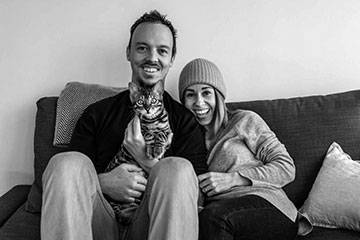Road of Recovery
To share the healing journeys of COVID-19 survivors, alumna Morgana Wingard (’05) is on a ride of her own throughout the entire country
“It is through our stories,” says alumna Morgana Wingard (’05), “that we see God at work.” A humanitarian storyteller, Wingard knows whereof she speaks, having helped an international media organization document Ebola survivor stories in West Africa seven years ago. Wingard would have liked to pursue her own personal project about the survivors, but didn’t have the resources to do so. Her work, however, made such an impact on diminishing the spread of the Ebola virus that she did not hesitate to record the experiences of those enduring a different disaster in 2018—Cape Town’s “Day Zero” water crisis, when officials announced that the city was three months away from running out of municipal water.
When COVID-19 started spreading in her current hometown of New York City, Wingard, accompanied by her husband, Jaco Bester, immediately began work on her COVID-19 Survivor Diaries, telling the stories of those who endured the deadly virus and bringing humanity to the scary, unsettling, and often ugly disease. The duo has now interviewed more than 140 individuals. In addition to sharing the stories on the project’s social media account, she is also creating a book and film series. Wingard contacted Jeep’s global creative director on Instagram in search of sponsorship. The automaker agreed to provide them with a Jeep Grand Cherokee for six to nine months to pull their Airstream around the country to document the stories of survivors from all 50 states.
The goals of the project are many. At a basic level, it’s an effort to spread awareness. Wingard spoke with one healthcare worker who contracted the virus but who managed not to spread it to anyone in her household by wearing a mask at home and isolating herself. “She protected her entire family that way,” says Wingard.
Another goal is education about the experience of the virus. Wingard has found, for example, that COVID-19 can lead to many side effects, including sexual dysfunction. “This is not in the news much yet,” observes Wingard, “but talking about it is important so that those having this experience can understand it and start their healing journey.”
The stories are also designed to increase awareness of the extensive nature of the
other “silent illnesses” that so many people are battling. “A lot of people we talk
to are struggling with depression. Many are struggling with anxiety and feeling alone and isolated,”
she says. Depression rates have risen more than threefold in the US during the pandemic,
and feelings of stress and anxiety are considered natural responses to it. Yet the
belief that mental health issues are signs of personal weakness is still widespread.
The survivors’ stories attempt to remove the stigmas around emotional and mental health
difficulties and “help others going through these challenges realize that they’re
not alone,” Wingard says.
with depression. Many are struggling with anxiety and feeling alone and isolated,”
she says. Depression rates have risen more than threefold in the US during the pandemic,
and feelings of stress and anxiety are considered natural responses to it. Yet the
belief that mental health issues are signs of personal weakness is still widespread.
The survivors’ stories attempt to remove the stigmas around emotional and mental health
difficulties and “help others going through these challenges realize that they’re
not alone,” Wingard says.
The wisdom of treating ourselves gently is one of the lessons Wingard hopes to share. She notes that regardless of how physically sick they were with the virus, those who seem to be faring the best emotionally and mentally are those who are very intentional about their healing process. One interviewee in her late twenties, who previously had lived the typical, active life of a young adult, is now using a wheelchair to get around. Her physical strength was so diminished that in order to manage her interview with Wingard, she stayed in bed the entire day before and cleared her schedule to do the same on the day following the meeting. “She’s been incredibly intentional about learning what her limits are emotionally and physically so that she wouldn’t crash.” says Wingard.
Wingard’s stories focus on those who have contracted the coronavirus, but she points out that everyone is a survivor of the pandemic. “There is so much division in this country, but this is something that we’re all going through together,” she says. “I’ve been very moved by seeing the commonalities in our experiences, both the pain that we’re undergoing and the way that we’re encouraging one another. We’re all survivors. I’m hoping my project will demonstrate that and help unify us.”
